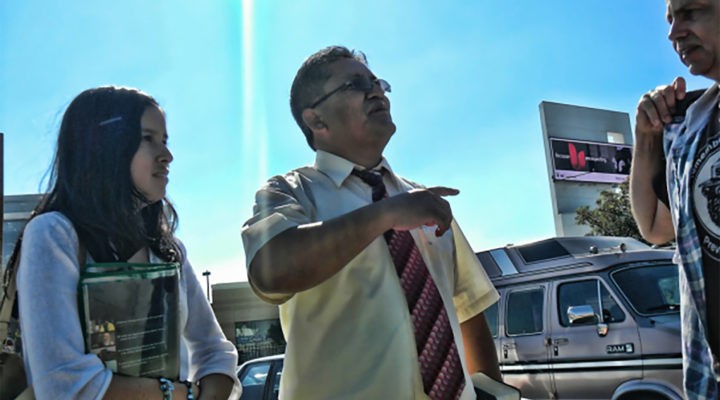Some evangelical leaders say Christians should avoid the Catholic lead in not proselytizing Jews, but a rabbi and Baptist minister say sincere relationship building is essential.
Catholic and Jewish leaders recently exchanged documents affirming the authenticity of each other’s faiths.
It happened on the 50th anniversary of Nostra Aetate, the Vatican’s formal condemnation of anti-Semitism, Christianity Today reported in December.
A group of Orthodox rabbis led off with a statement that “Christianity is neither an accident nor an error, but the willed divine outcome and gift to the nations.”
The Vatican followed suit with a declaration that Jews should not be evangelized by Catholics.
Should evangelicals follow the Catholic lead and cease efforts to convert Jews to Christianity? Several evangelical leaders said no in a CT story published this month. The New Testament, they explained, is clear that they have an obligation to share the gospel, period.
But in interviews with Baptist News Global, Christians and Jews engaged in interfaith dialogue said such attitudes make it increasingly difficult not only to build bridges between faiths, but between neighbors, co-workers and even families.
‘If feels intrusive’
For starters, Christian efforts to evangelize Jews can be insulting and emotionally painful to those being evangelized, said Rabbi Joshua Stanton, assistant rabbi at B’Nai Jeshurun, a Reform congregation in Short Hills, N.J.
“It can feel disrespectful — as if our religious tradition is not enough,” Stanton, who has also served as director for the Center for Global Judaism, told BNG.
Being proselytized can also be unnerving or frightening if a co-worker or boss is leading the effort, Stanton said.
And it can feel uncomfortable when it’s a neighbor doing the proselytizing. That can leave the Jew or Muslim worried about disharmony in the neighborhood if the overture is spurned.
“It feels intrusive if one frames a relationship with an agenda in mind to change who we are as people,” Stanton said.

Ultimately, it may also be disconcerting just knowing how ugly anti-Semitism can be, said Stanton, who also writes for the Huffington Post.
“Because of anti-Jewish sentiments in history and prevalent today, there is fear of what might happen if an advance is rebuffed,” he said.
But when people of different faiths approach each other with respect and seeking mutual understanding, true relationships can result, Stanton said.
“And from the standpoint of evangelicals, that can be more effective,” he said.
At its healthiest, religion is experienced by individuals as a web of relationships in which no one is trying to change the other, he said.
“When we reduce relationships to transactions, we reduce the potential to build sacred community,” Stanton said.
Reaching a wider audience
And that is why interfaith work is never easy, said Mitch Randall, a Baptist minister in Oklahoma who is heavily involved in regional interfaith efforts with Jewish, Muslim and Christian leaders.
Interfaith dialogue requires a lot of time, patience and prayer to acknowledge deeply held and conflicting theological convictions. The goal is to then move onto solving problems confronting the larger community, Mitchell said.
“We do have differences and we talk about those and debate those, but we never lose sight of the fact we are all created in God’s image,” he said.
Then come the rebukes — from a participant’s own congregation, denomination or wider community, he said.
One of the most consistent criticisms he gets comes from other Christians, who want him to evangelize those he works with.
“They say you have the opportunity to engage people of other faiths,” said Randall, pastor at NorthHaven Church in Norman. “Why do you not take the opportunity to present the gospel to them?”

One answer to that question is that efforts to convert merely draw attention to differences — which are not conducive to dialogue, he said.
“There are certain issues we are discussing — mainly having to do with creating a better community and a better world,” Randall said. “To do that, we have to focus on our commonalities.”
Another answer is that proselytizing also contributes to the growing us-versus-them dynamic sweeping through American culture.
“Evangelical philosophy plays a part in this,” he said. “We are at a point in our society where they are either on our team or they are not on our team, and we have to get away from that mentality and that theology.”
Randall added there is more than one way to share the gospel.
The most effective way is to live a Christ-like life before his colleagues from other traditions, he said.
“When I demonstrate the love of Christ to people of other faiths, I am preaching the gospel and I am demonstrating the gospel to them,” he said.
In emails and Facebook posts and calls, Randall said he is often thanked by local residents for his interfaith participation.
“One of the things I hear voiced … is ‘it’s nice to see a Baptist minister engaged with an imam and a rabbi without damning them or demeaning them,’” he said.
That amounts to a form of evangelism, he added.
“That also speaks to the larger community.”


